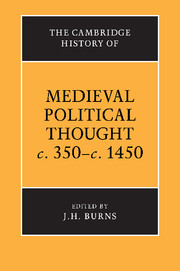Book contents
- Frontmatter
- Introduction
- I Foundations
- II Byzantium
- III Beginnings: c. 350–c. 750
- IV Formation: c. 750–c. 1150
- V Development: c. 1150–c. 1450
- 13 Introduction: politics, institutions and ideas
- 14 Spiritual and temporal powers
- 15 Law
- 16 Government
- 17 Community
- 18 The individual and society
- 19 Property and poverty
- Conclusion
- Biographies
- Bibliography
- Index of names of persons
- Index of subjects
- References
16 - Government
from V - Development: c. 1150–c. 1450
Published online by Cambridge University Press: 28 March 2008
- Frontmatter
- Introduction
- I Foundations
- II Byzantium
- III Beginnings: c. 350–c. 750
- IV Formation: c. 750–c. 1150
- V Development: c. 1150–c. 1450
- 13 Introduction: politics, institutions and ideas
- 14 Spiritual and temporal powers
- 15 Law
- 16 Government
- 17 Community
- 18 The individual and society
- 19 Property and poverty
- Conclusion
- Biographies
- Bibliography
- Index of names of persons
- Index of subjects
- References
Summary
Sources
In order to discuss medieval theories of government one must first locate them. There are very few medieval works whose avowed aim was the examination in conceptual terms of current governmental problems. Therefore the bulk of material has to be extracted from works that had another purpose. But this at once creates uncomfortable choices. The sources conventionally used by historians of political philosophy differ both from those on which constitutional historians habitually draw and from those appropriate for the investigation of medieval man's unspoken assumptions about government. Yet all three have some claim to reveal the ‘real’ political thought of the age. And past studies suggest that they do not blend easily.
Because it would be folly, in the space available, to attempt a complete approach to the subject, this discussion will be limited both geographically and conceptually to the examination of certain academic and official texts on government produced in England and France between 1150 and 1450. Concentration on England and France is justified by their strong cultural and political ties throughout the later middle ages, and by a large stock of common experience. Although by the end of the period their political systems were often contrasted, they nevertheless remained more like each other than either was like the Empire, Italy or Spain. The emergence of powerful vernacular traditions, the loosening of the link between Paris and Oxford universities, the growing sense of national identity, could not totally erase the past they had shared.
- Type
- Chapter
- Information
- The Cambridge History of Medieval Political Thought c.350–c.1450 , pp. 477 - 519Publisher: Cambridge University PressPrint publication year: 1988
References
- 15
- Cited by

